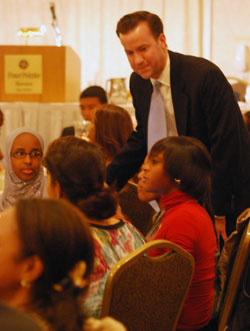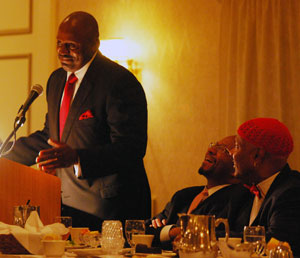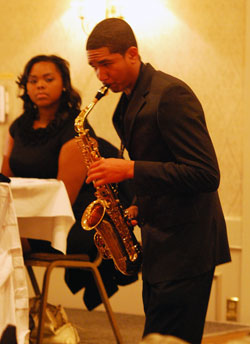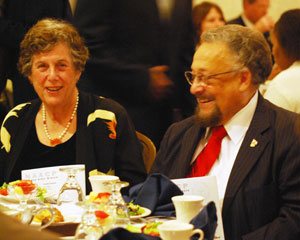Ann Arbor NAACP Honors Academic Success

Fatou Ndaw, left, and Chinyere Onimo are two of the 81 students from Ann Arbor public high schools who were honored at Saturday's NAACP Freedom Fund dinner. Ndaw and Onimo attend Huron High School. (Photo by the writer.)
William Hampton came up to the podium and smiled, looking out at the crowd of several hundred people gathered at the Four Points Sheraton ballroom. “Isn’t this great?” he said.
Hampton, president of the Ann Arbor branch of the NAACP, had just finished handing out certificates of achievement to several dozen high school students at Saturday night’s Freedom Fund dinner. They were honored for maintaining at least a 3.20 grade point average in the spring term of 2009.
In his keynote speech, Washtenaw County sheriff Jerry Clayton told students they had a responsibility to be leaders in their schools and community, and to push their peers to excel. “There should be double the number of students in this room next year,” he said.
Freedom Fund Scholars
The Ann Arbor branch of the National Association for the Advancement of Colored People is celebrating its 60th anniversary this year, as well as the 100th anniversary of the founding of the national organization. In his welcoming remarks on Saturday, Ronald Woods, a professor in Eastern Michigan University’s African American Studies Department, noted that “more than anything else, we associate the work of the NAACP with the great struggle for educational equality.”

Todd Roberts, superintendent of the Ann Arbor Public Schools, talks with students who were being honored at the Oct. 7 Freedom Fund dinner. (Photo by the writer.)
The local branch has made education its priority. Woods put that mission into a broader context, saying that the students being honored for their academic achievement on Saturday are beneficiaries of the spirit of Brown v. Board of Education, the landmark 1954 U.S. Supreme Court decision that set the stage for school desegregation. [Link to .PDF list of Freedom Fund scholars.]
In recognizing the student scholars, Todd Roberts – superintendent of the Ann Arbor Public Schools – said that education was crucial for society’s future, and that despite the school system’s challenges, Ann Arbor would continue to provide a quality education.
The reference to “challenges” was likely an allusion to funding difficulties faced by AAPS and other public schools in Washtenaw County. A countywide school millage, which would have raised $30 million annually for Washtenaw County schools – including $11 million for the Ann Arbor system – was defeated by voters on Nov. 3. School officials had hoped to raise the additional funds to offset state-level cuts. [Previous Chronicle coverage: "Does It Take a Millage?" and "New State Cuts Add to School Crisis"]
The millage defeat and the plight of local schools was a topic of discussion among many of the people who attended Saturday’s dinner, including more than a dozen elected officials from local school boards, the county commission and the Ann Arbor city council.
During the evening, leaders of the Ann Arbor NAACP also gave lifetime achievement awards to Harry J. Williams, who served as president of the local branch from 1992 to 2004, and to Norma and Frederick McCuiston, who were instrumental in reviving the group in 1983, after it had lost its charter in 1978 due to a lack of members.
Keynote Speech: Jerry Clayton
The main speaker for the evening was Jerry Clayton, Washtenaw County’s first African American sheriff and the first African American elected to a countywide position in Washtenaw. Clayton took office in early 2009 after defeating incumbent Dan Minzey in the 2008 Democratic primary, and winning the general election last November.
In introducing him, Rebekah Sharpe – a University of Michigan senior and assistant secretary of the NAACP’s UM branch – noted that Clayton has had to make dramatic budget cuts but has not laid off any officers. In fact, she said, he’s been able to send deputies to write tickets in Ann Arbor and Ypsilanti – a comment that drew laughs from the crowd.

Jerry Clayton, Washtenaw County sheriff, gives the keynote speech at the Oct. 7 Freedom Fund dinner, hosted by the Ann Arbor branch of the NAACP. To the right are EMU professor Ronald Woods and William Hampton, president of the Ann Arbor NAACP branch. (Photo by the writer.)
Clayton began by joking that the deputies were sent to help improve public safety in the cities, “and if tickets come as a byproduct of that, I apologize.”
Clayton introduced his wife of 22 years, Sybil, and said that they’ve always told their three sons that everyone makes mistakes – it’s the choices you make following those mistakes that matter. How you respond reflects your depth of character, he said.
The themes of character, hard work and leadership were woven throughout Clayton’s remarks. He said that in his 25 years working in the criminal justice system, he’s learned two things: 1) success is not guaranteed, and 2) nothing you achieve is a result of luck. The students being honored by the NAACP are all smart and have achieved success so far, he said, but that current status doesn’t guarantee future success.
Achieving success requires several things, he said. You need a vision of what you want to achieve. “Without a path and a plan, you can walk aimlessly,” he said. It’s also important to enlist the support of everyone around you – parents, teachers, mentors. “I know there are times when you think no one understands,” he said, “but we do.”
Clayton urged the students to take a no-holds-barred approach to reaching their goals, and not to be deterred by people’s envy or jealousy. Never walk away from a challenge, he said, and don’t get discouraged – you never know what’s just around the corner.
Clayton also recommended following the advice from Sean Covey’s “The 7 Habits of Highly Effective Teens.” Above all, he said to the students, you have a responsibility to be leaders and to lift up your classmates. Leading by example, they can encourage others to achieve the same kind of success they already have. “You can be a part of that,” he said.





